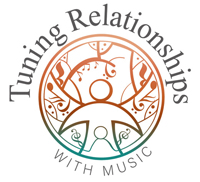Most of us have used music at some time in our lives to help us to feel our feelings and spend time with them in a meaningful way. Whether it’s playing a song over and over that expresses our sadness about a relationship that has ended, or listening to music that reconnects us to an impactful experience we have had, music can immediately and strongly evoke emotions. Using music in this way can help us to process difficult emotional experiences – we need to FEEL in order to HEAL.
For people who have survived traumatic experiences, this process may be hard to enter into. If I have coped with difficulties by disconnecting from intense feelings, then I may try to avoid anything that may activate those feelings. The problem is – it's almost impossible to successfully avoid everything that may remind me of those difficulties. For trauma survivors who are now parents, children’s intense emotional expressions may become that reminder. This will play havoc with their ability to respond in an emotionally regulated and attuned way to their child’s emotions.
In therapy, music can be used to facilitate a safe and gradual connection to intense feelings that are associated with past trauma. By being supported to connect to feelings at a pace and in a way we can manage, processing of these feelings becomes possible, though difficult. For parents and children managing intense feelings that emerge during their interaction with each other, music can serve either as a way to soothe or ‘dial down’ the intensity of an emotion, or alternatively to ‘dial up’ the intensity of an emotion in a way that enables us to examine it from a different vantage-point (that is – I can look at my strong emotions as they are expressed in music, rather than experiencing them as locked up inside my body). Once our own emotions are less intense, as parents we can then attend to our child's emotional experience.
If you would like more information about how music is used in therapy, you may wish to check out the Australian Music Therapy Association’s website at https://www.austmta.org.au
Author: Vivienne Colegrove
